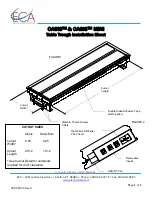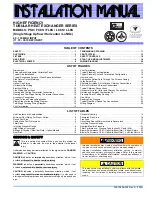
GE
D
IRECTION
FQ091019, R
EVISION
2
V
IVID Q
N S
ERVICE
M
ANUAL
2-2
Section 2-2 - Console Requirements
Section 2-2
Console Requirements
2-2-1
Unit Environmental Requirements
NOTE:
The Vivid q N portable ultrasound scanner system may be operated at an altitude of up to 3000
meters (9842 ft)
2-2-2
Cooling Requirements
The cooling requirement for the Vivid q N environment is 350 BTU/hr.
The cooling requirement for the SafeLock Cart environment is ~70 BTU/hr.
These figures does not include the cooling required for lights, people, or other equipment in the room.
NOTE:
Each person in the room places an additional 300 BTU/hr demand on the environmental
cooling.
2-2-3
Lighting Requirements
For system installation, updates and repairs, bright lighting is required. However, operator and patient
comfort may be optimized if the room lighting is subdued and indirect when a scan is being performed.
Therefore, a combination lighting system (dim/bright) is recommended. Keep in mind that lighting
controls and dimmers can be a source of EMI which could degrade image quality. These controls should
be selected to minimize possible interference.
2-2-4
Time and Manpower Requirements
Site preparation takes time. Begin pre-installation checks as soon as possible to allow sufficient time to
make any required changes. If possible, begin these checks as many as six weeks before system
delivery.
Table 2-2
Environmental Requirements
Requirement
Temperature
Relative Humidity
(non-condensing)
Air Pressure
Operational
+10 —
+
40
o
C (50 — 104
o
F)
30 — 85%
700 — 1060 hPa
Storage
-20 — +60
o
C (-4 — 140
o
F)
30 — 95%
700 — 1060 hPa
Transport
-10 — +60
o
C (14 — 140
o
F)
30 — 95%
700 — 1060 hPa
CAUTION
If the system has been in storage or has been transported, please see the acclimation
requirements
before
powering
ON
and/or using the system.
See “Installation Warnings” on
CAUTION
Only one person is required to unpack the Vivid q N ultrasound unit; at least two people must be
available to roll the system down the wheeling ramp. Attempts to move the system considerable
distances (or on an incline) by one person alone, could result in personal injury, and/or damage
to the system.















































